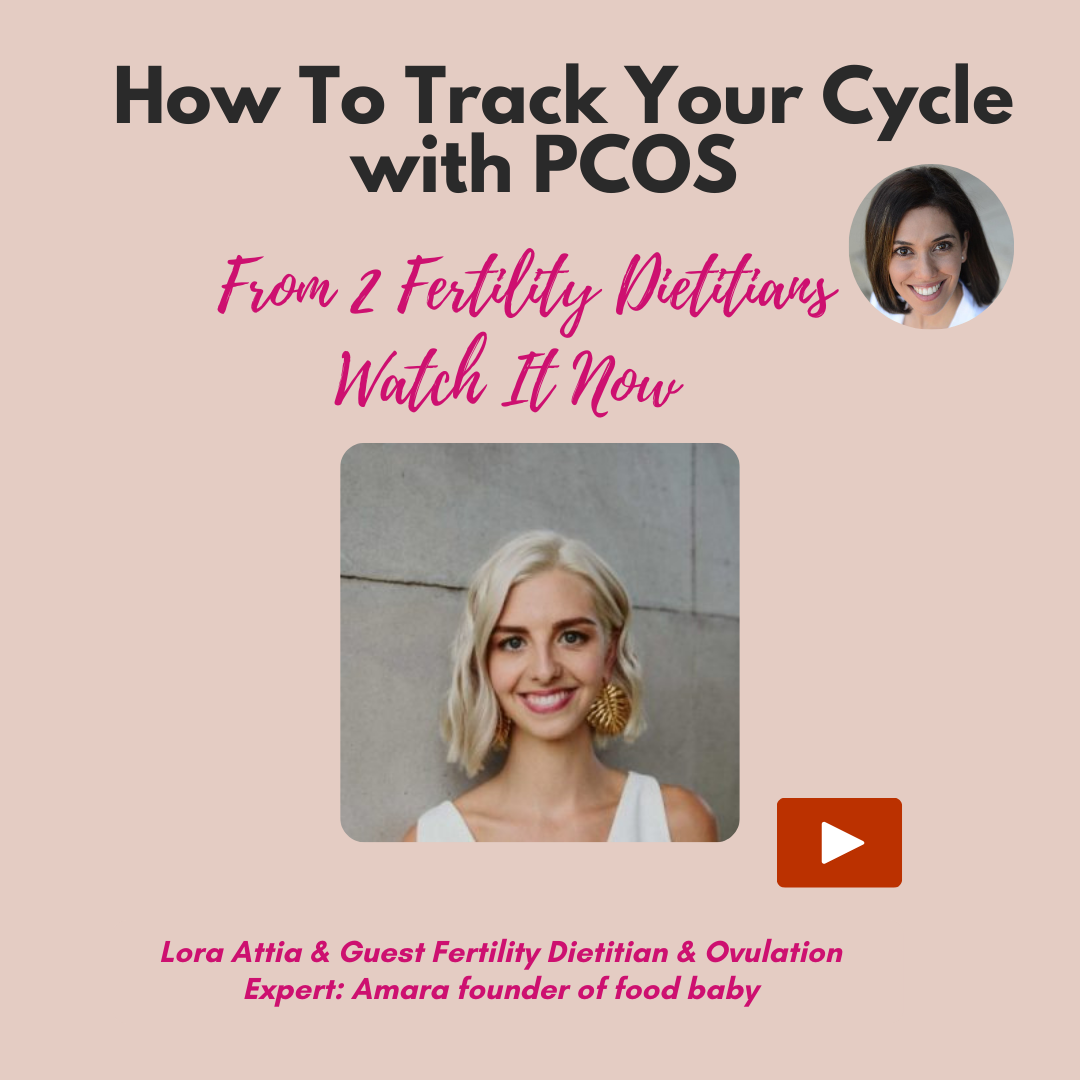Tips for Cycle Tracking with PCOS with guest fertility dietitian and ovulation expert Amara from Food Baby
Amara is a fertility dietitian who started Food Baby after her own struggles to start a family. She now uses her knowledge to help others get pregnant faster and have the healthiest pregnancy possible through her online program, Optimizing Ovulation.
I interviewed her to help share some really important tips for tracking your cycle with PCOS
Watch our IGTV interview here:
Dietitian & Fitness For Mums (@dietitianformums) • Instagram photos and videos

Your Cycle & Signs and Symptoms of Ovulation
The Menstrual Cycle
The menstrual cycle consists of hormonal and physical changes that prepare a women’s body to produce eggs and create the right environment in the uterus to support a pregnancy.
The menstrual cycle is measured from the first day of your period to the first day of your next period. The average length of a cycle is 28 days but can also be between 26 to 35 days. However if you are experiencing irregular cycles that may be less than 21 days or more than 35 days, you should speak to your doctor to determine the underlying cause. If your period has stopped altogether or you are experiencing eight or less menstrual cycles per year, this is a red flag and shouldn’t be ignored speak to your GP and seek help from a fertility dietitian.
There are four phases in the menstrual cycle, to learn more about each phase in more detail follow the link menstrual cycle – Better Health Channel.
Ovulation
Ovulation involves the release of an egg from one of the ovaries once every month in preparation for a pregnancy. However, some women experience irregular ovulation or no ovulation at all. Ovulation is triggered by hormonal signaling and complex interactions that generally occur two weeks before a period begins.
How do I know if I have ovulated?
If you do not know the answer to this question, please let me reassure you, that you are not alone! This is my most common question asked when I see my clients in my 1:1 fertility coaching program. Unfortunately sex education classes don’t go into enough detail about how a women’s reproductive system works or common hormonal issues that impact ovulation. In addition most women will report learning more about how to NOT get pregnant!
Four key hormones to be aware of are:
- Follicle stimulating hormone: (FSH) rises early in our cycles, stimulates the ovary to produce between 5-20 follicles and one follicle will mature to into an egg
- Estrogen: a rise in estrogen makes us feel good when that rises (in the follicular phase)usually during menstruation
- Luteinizing hormone: a rise in (LH) is part of what triggers of ovulation peaks after ovulation has occurred and this is why it is tested for in a ovulation predictor kit (OPK).
- Progesterone: rises after ovulation in the luteal phase and stays high if a pregnancy occurs
Signs and symptoms of ovulation include changes in:
- Increase in cervical mucus (mucus becomes slippery, stretchy and often described as egg white in appearance)
- Change in mood such as increased libido in the lead up to ovulation
- Small rise in body temperature when measured at rest

My top tips to support and increase ovulation!
- Track your cycle and know your cycle length
- Record your body temperature at the same time before you get out of bed using a traditional thermometer
- Try a Luteinizing Hormone (LH) predictor kit that measures the amount of LH that typically surges 36 hours before ovulation occurs this may help better time sex. False positive results can occur so it is important to be also tracking your cycle to have a better understanding of your menstrual cycle.
- Pay attention to the changes in your cervical mucus, if you are finding it hard to detect a change in the consistency of your mucus, this may be a sign that you may need to increase your water intake!
- Diet- we know not eating optimally from all food groups impacts ovulation and menstrual cycles. If you are feeling overwhelmed what to eat to improve ovulation or manage PCOS to aid anovulatory cycle you can check out some tips that I covered here Two Fertility Dietitians Top 5 Tips to Optimise Ovulation with PCOS – Lora Attia (dietitianformums.com.au)
OR: it may be time to get a personalized dietary plan to optimise ovulation and fertility!
Research has shown by making 5 specific dietary changes fertility can be improved by 69%!! That is a significant statistic that only a fertility dietitian has the skill set to personalize to your unique situation.
Join my program!
Get Pregnant with PCOS – 12 Week Program – Lora Attia (dietitianformums.com.au)



